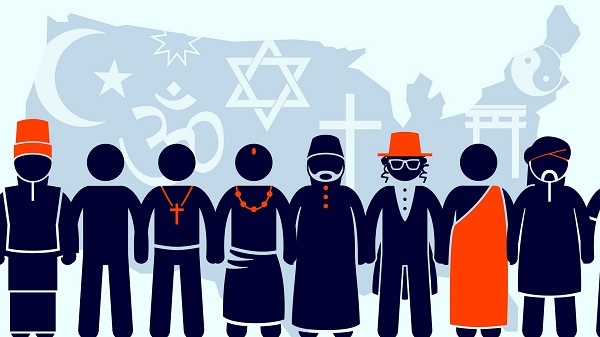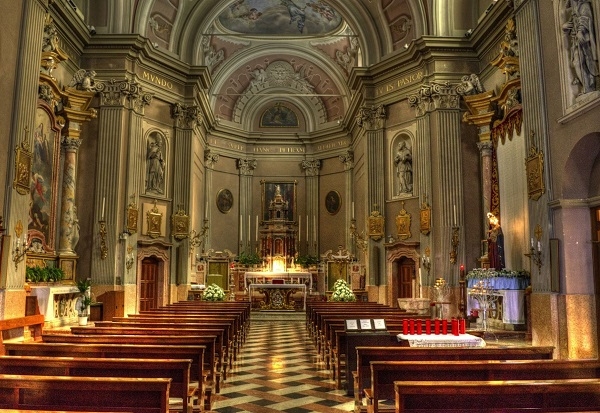Tolerance in Xnity
Total Views |
Tolerance of what? Where and when does this word begin? What are the origins of the word tolerance? To understand must understand Christianity from its beginnings. Probably sometime around 30 AD, Jesus (if he really existed) was crucified. Starting 70 years after crucifixion - Mark, Martin, Luke, and John wrote about the life and works of Jesus. From then until 4th century the idea of Christianity was being defined.
This Early Church had two main schools of thought. There were those from Arian school (of Arius) who believed that Father was the God, with no beginning and end. He was infinite and eternal being. His son Jesus, was born and thus had a beginning and end. The Son was a finite being. He was not eternal and was not as divine as the Father. The other school of thought, that of Alexander of Alexandria (Egypt) believed that the Son was just as great and just as divine as the Father.

In 325 AD, Roman Emperor Constantine I called Council of Christian Bishops in Nicea. In this council, Alexander's view of Father and Son both being divine was accepted. It was now in 4th century that Jesus was declared as God. All copies of Thalia, a book written by Arius were burnt. Arius was probably poisoned to death by his opponents and his supporters were exiled. Thus the second school of thought was nipped in its bud.
In 3rd century, Mani of Babylonia, considered himself as a prophet in the line of Adam, Buddha, Zoroaster and Jesus. He established Manichaeism Church which was popular and had following from Spain to Egypt to Persia. Manichaeism was vigorously attacked by the Catholic Church and it soon almost entirely disappeared from Europe.
Influenced by Manichaeism, in 8th century another sect arose in Christianity called Catharism. Meaning 'Pure Christians' or 'Good Christians'. This sect believed in twin entities of same power one God other the Satan. In early 13 century, their books were burnt and Cathars were expelled. By 14th century thousands of Cathars were massacred and this Christian sect was annihilated.
Another Christian sect Waldensian, was an ascetic sect of the 12th century. They too were declared to be heretics and persecuted by the Catholic Church.
Within the Roman Catholic Church, many like John Wycliff tried to bring in reforms. He began to translate the Bible into English. All copies of his books were burnt by the order of the Pope in 1410. His writings were banned, he was excommunicated, he was declared a heretic and was not allowed a burial after death. Another preacher of reform was John Hus. He was burnt at the stake in 1415.
From 4th century to 14th century there was no force, no Christian sect that could stand against the Roman Catholic Church. No second school of thought could exist in Christianity. Every person or sect that questioned the Roman Catholic Church was labelled heretic and had to face an Inquisition that was followed by inevitable death punishment. The Church had crushed every competition and every opposition.
At this point we need to understand another concept of the Church called 'indulgence'. Any person who had committed a sin or a crime could reduce the punishment he was to receive in after life, by 'purchasing indulgence' from the Church. The Church acquired huge sums of money through this practice. In 16th century Martin Luther challenged this practice. He wrote the 95 theses that condemned this practice. The 95 Theses were printed and pasted on the doors of Churches in Germany. Martin Luther was excommunicated by the order of the Pope. Yet he had started the Reform movement or Protestant movement. It was a large scale protest against Catholic Church and led to the establishment of a separate Protestant Church, a dilute form of Catholic Church. Amongst other things it allowed its priests to marry, and stated that the head of the Protestant Church was the Head of the State and not the Pope of Roman Catholic Church.

The Protestants too did not escape persecution. For example a Protestant leader William Tindall was burnt at the stake for translating Bible into English, in 1536. Countries where the king was Catholic, his Protestant subjects were persecuted. Countries where the king was Protestant, his Catholic subjects were persecuted. Protestant and Catholic kingdoms fought many wars amongst each other over religion. Actually over ‘sect’ of Christianity. Religious Wars like - the 80 year war between Spain and Dutch Republic, the 30 year war, the British Civil Wars and other wars claimed millions of lives.
At last leaders could no longer see the meaningless bloodshed and the devastation caused by the wars. The wars were not ending the disagreement between the Christian sects. In 1648, European countries came to call "Peace of Westphalia". It consisted of multiple peace treaties that were signed at various cities, at different times by Roman Church and almost a hundred delegations of different states. It took a period of 5 years of tough negotiations to arrive at these major points of this peace treaty were –
1. Christians will have the right to practice their faith in private, in the privacy of their homes.
2. A Prince will have the right to choose the religion for his State. Options being - Catholic or Protestant.
3. Catholics and Protestants will not kill each other over the difference of their ideas. They shall 'tolerate' each other.
One must note that they agreed to 'tolerate' only Christian sects. Not the Druids, not Romans, not Pagans, not Jews, not Gypsies, not Muslims or Buddhists or Hindus. Secondly they would somehow only 'tolerate the existence’ of people practicing other Christian sects, but would not respect them.
‘Religious Freedom’ in the Europe was limited to the freedom of following only those sects of Christianity that believed in divinity of Jesus. Any Christian who denied the divinity of Jesus was eligible for death sentence.
This is what 'tolerance' means. It applies in its own very narrow sense to the Sects of Christianity only. It is a Christian term that belongs to a Christian Dictionary. Outside of Christianity the term ‘Tolerance’ does not make any sense at all.
Note - The Hindus, cannot stoop this low, to the level of the word ‘tolerance’. For the Hindu way teaches to accept and respect not only other sects within Hinduism, but other religions too. This Hindu philosophy by default extends beyond the human world to animals, plants, rivers, mountains, Earth, Air, Fire and Sky too.

